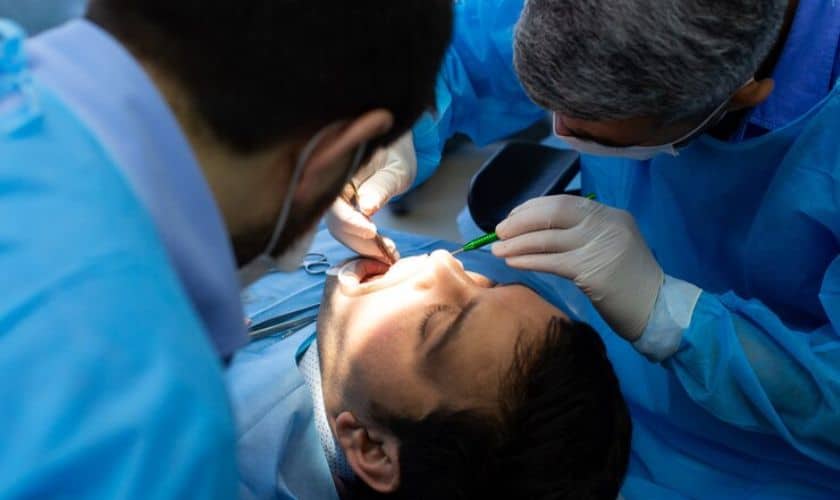Published on September 19, 2023

Wisdom teeth, also known as third molars, often make a dramatic entrance in our late teens or early twenties. While some individuals may not experience any issues with these late-blooming molars, many find themselves facing problems such as pain, crowding, and infections. In these cases, the recommended course of action is wisdom tooth extraction, a procedure aimed at preserving oral health and providing relief. However, the extraction itself is just the beginning of the journey to recovery, and how you care for your mouth afterward can significantly affect the healing process.
Dos & Don’ts of Wisdom Tooth Extraction Aftercare:
Do: Follow Your Dentist’s Instructions
Your dentist will provide specific post-operative instructions after your wisdom tooth extraction. These instructions are tailored to your unique case and should be followed diligently. They may include details on pain management, wound care, and dietary restrictions. Ignoring or deviating from these instructions can lead to complications and delayed healing.
Don’t: Neglect Proper Oral Hygiene
Maintaining good oral hygiene is crucial during your recovery. However, you should be gentle when brushing and flossing near the surgical site. Use a soft-bristle toothbrush and avoid vigorous rinsing or spitting, especially in the first 24 hours. Instead, rinse your mouth gently with warm salt water after meals to promote healing and prevent infection.
Do: Manage Pain and Swelling
Pain and swelling are common after wisdom tooth extraction. Your dentist may prescribe pain medications or recommend over-the-counter options. Take these medications as directed to manage your discomfort effectively. Applying an ice pack to the outside of your cheek for the first 24 hours can also help reduce swelling.
Don’t: Smoke or Use Straws
Smoking and using straws create suction in the mouth, which can dislodge the blood clot that forms at the extraction site. This can lead to a painful condition known as a dry socket and delay healing. It’s essential to abstain from smoking and avoid using straws during your recovery period.
Do: Choose Soft and Nutrient-Rich Foods
Opt for soft and easy-to-chew foods in the initial days following your wisdom tooth extraction. Consider items like yogurt, applesauce, mashed potatoes, and well-cooked pasta. These foods provide essential nutrients while minimizing stress on the surgical area.
Don’t: Consume Hot, Spicy, or Crunchy Foods
Hot foods can irritate the surgical site, while spicy and crunchy foods can be abrasive and potentially harm the healing area. Avoid foods like chips, popcorn, and hot sauces during the early stages of recovery.
Do: Stay Hydrated
Proper hydration is crucial for the healing process. Drink plenty of water, but be cautious not to use straws, as mentioned earlier. Staying hydrated helps flush out toxins, aids in tissue repair, and reduces the risk of complications.
Don’t: Rush Back into Strenuous Activities
Give your body time to heal by avoiding strenuous activities and heavy lifting for a few days after the extraction. Rest and relaxation are essential components of a smooth recovery.
Do: Attend Follow-Up Appointments
Your dentist will schedule follow-up appointments to monitor your progress and ensure you are healing correctly. Attend these appointments as recommended to address any concerns and receive further guidance on your recovery.
Don’t: Ignore Signs of Complications
While some discomfort and swelling are expected after wisdom tooth extraction, it’s essential to be vigilant for signs of complications such as excessive bleeding, severe pain, or signs of infection. If you experience any of these issues, contact your dentist promptly.
Wisdom tooth extraction can be necessary to preserve your oral health and alleviate pain, but proper aftercare is equally vital. Adhering to these dos and don’ts of wisdom tooth extraction aftercare can facilitate a smooth and comfortable recovery. Be sure to visit Best Smiles Southside and get the required guidance for your treatment. Remember to follow the instructions given by our dentists in Richmond, VA, diligently, maintain gentle oral hygiene, manage pain and swelling, and make wise choices when it comes to your diet.
While the initial days after extraction may require some adjustments to your routine, the long-term benefits of a healthier, pain-free smile make it all worthwhile. Keep in mind that everyone’s healing process is unique, so it’s essential to listen to your body and seek professional guidance if you encounter any concerns. With the right care and patience, you’ll be on your way to a full recovery, and soon enough, you’ll.
